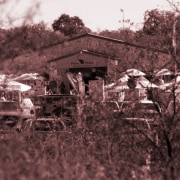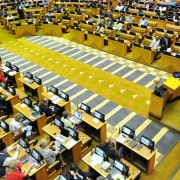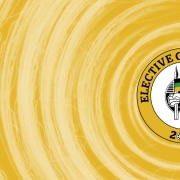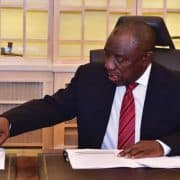|
Getting your Trinity Audio player ready...
|
As South Africa waits to hear from the Constitutional Court (ConCourt) if it will accept President Cyril Ramaphosa’s judicial review application of the Section 89 panel report on Phala Phala – for which papers were filed on Monday – his political backers and opponents alike continue to exchange public statements to support their conflicting causes.
Meanwhile, the National Assembly debate on the report takes place on 13 December, three days before the start of the ANC’s national elective conference, at which Ramaphosa will seek to retain his position as party president. Some news reports say that the ANC caucus in Parliament has been instructed to toe the party line next week and oppose the adoption of the report – which could lead to an impeachment process – while others point out intentions from within the party to go rogue and protest against that.
Parliament declared on Monday evening that Ramaphosa’s decision to go the legal route outside of the parliamentary process will not deter proceedings. This is according to its chief legal adviser Zuraya Adhikarie, who addressed MPs during a virtual meeting called by National Assembly speaker Nosiviwe Mapisa-Nqakula. MPs will vote by means of a roll call, which means each will have to declare openly which way they are voting. The African Transformation Movement (ATM) applied for the process to be done by secret ballot, but Mapisa-Nqakula declined the application.
In his affidavit – stamped by the ConCourt on 5 December – Ramaphosa takes aim at the three-member panel’s inability to discern its intended mandate; its failure to differentiate between mere information and evidence to help it arrive at a conclusion; and its overreach in finding him wanting for abuse of power. The president sets out his arguments elaborately throughout the 59-page document, lamenting his innocence from the four charges on which the panel was meant to decide the probability of an impeachable offence on his part.
“The purpose of this application is to review and set aside the report and particularly its recommendation in paragraph 264. The panel rendered its report and made its recommendation in the exercise of public power. They are thus reviewable under the constitutional principle of legality,” he starts off by noting.
“I submit that the panel misconceived its mandate, misjudged the information placed before it and misinterpreted the four charges against me. It moreover strayed beyond the four charges and considered matters not properly before it.”
Hearsay vs information vs evidence
The ATM, the Economic Freedom Fighters (EFF), and the United Democratic Movement brought allegations before the panel regarding Ramaphosa’s conduct, citing violations of the Constitution and other laws. But he rebuts the findings of the panel in this regard, that there is a prima facie case that may be mounted in Parliament.
Ramaphosa argues in his affidavit that what the panel viewed as evidence was actually information, some of it hearsay, that should have been probed further, for the panel to find probable cause against him. But it relied instead mostly on the version of former correctional services director-general Arthur Fraser, and further information from the three political parties, to arrive at a conclusion that he has a case to answer.
“The panel’s purpose is tied to evidence: it was to make recommendation about whether there is ‘sufficient evidence’ of a constitutional violation. To rationally achieve that evidence-based purpose, the panel had to determine the admissibility and probative value of the evidence it was considering.”
For and against
Support for Ramaphosa’s assertion that the report is legally flawed and irrational is abound in legal circles. Retired Judge Dennis Davis said in an interview on 702 on Tuesday evening that he would rely on the outcomes of investigations by the Hawks and the Reserve Bank to determine whether Ramaphosa had committed any impeachable offences, and not the panel report.
“The president’s case is a plausible case showing irrationality … of course it’s political, and the problem here is that people who seem to have no problem with the public protector dragging everything off to court forever and ever, now have an enormous problem about the president in fact launching a review application which, on the face of it, is a plausible legal strategy,” said Davis.
ANC veteran and former Mpumalanga premier Matthews Phosa, himself a lawyer, has also weighed in on the findings of the panel, in a legal opinion by his firm, Loots and Phosa. EWN reports that Phosa questioned the panel’s ability to arrive at findings on the hearsay evidence of Fraser, among other points.
But Ramaphosa’s rivals believe he has a case to answer. EFF president Julius Malema told a media briefing on Monday that Ramaphosa erred in going the Constitutional Court route, essentially taking Parliament to court. He called for the president’s arrest, saying Deputy President David Mabuza can step in.
DA leader John Steenhuisen, on the other hand, has raised a concern for Ramaphosa’s anti-corruption agenda, whichever way things go. “It completely shatters his platform of cleaning up and cleaning out, and it really has been his clarion call across South Africa,” he is quoted by the Citizen newspaper.
“I think this fatally wounds the prospects of him being seen as someone who is able [to fight corruption] because every time he moves against government officials or corruption, they are going to throw this report back in his face and say ‘but hang on a second, you are wanting me to stop doing the following but you were doing the same thing on your farm’. It places him in a completely untenable situation.”








